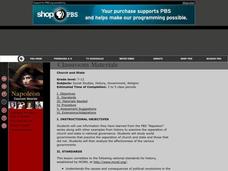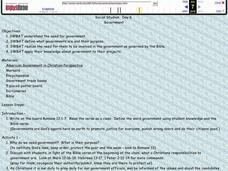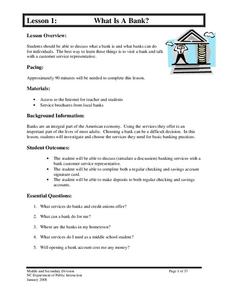GeorgiaStandards.org
Using Connecting Themes in First Grade Social Studies
Foster contributing members of society with a social studies unit focused on five aspects of community. First graders discuss themes of culture, groups, location, scarcity, and change with discussion questions and activities about...
Judicial Learning Center
Judicial Independence
Most people support the idea of an independent judiciary in theory until they hear about a court case that violates their principles. An informative resource explains why the concept is important. It also provides scholars of criminology...
Judicial Learning Center
Article III and the Courts
What's the best way to make sense of the Constitution? A helpful lesson contains both the text of Article III and annotation of each of its sections, breaking it down into easy-to-understand parts. It also includes links to a glossary...
K12 Reader
What's the Purpose? FDR's Pearl Harbor Speech
FDR's December 7, 1941 address to the nation is the focus of a reading comprehension exercise that asks middle schoolers to read an excerpt from the Pearl Harbor speech and determine the president's purpose.
John F. Kennedy Presidential Library & Museum
Ask Not What Your Country Can Do for You
Ask not what the lesson here can do for you, but what you can do with the lesson. The answer is quite a lot! Young scholars revisit JFK's famous inaugural address with a focus on his plea for civic engagement. There's a letter to JFK...
US House of Representatives
A Picture is Worth a Thousand Words
Groups select a photograph from one of the four eras of African Americans in Congress and develop a five-minute presentation that provides background information about the image as well as its historical significance. The class compares...
Curated OER
What is Brazil's Government Like?
Students compare and contrast the American system of government with that of Brazil. They research how the Brazilian govenment functions.
Curated OER
American Lives in Two Centuries:What Is an American?
High schoolers decide what it means to be an American. In this historical perspectives lesson, students read Crevecoeur's "Letter from an American Farmer," and interviews with everyday Americans from the Works Progress Administration....
Curated OER
Social Studies: Church and State
Discuss the separation of church and state as it relates to government entities. This is a great way to launch a discussion on the relationship between these groups. Learners analyze this relationship in governments throughout the world,...
National Endowment for the Humanities
Revolution '67, Lesson 2: What Happened in July 1967? How Do We Know?
Even in a world in which dozens of participants and curious onlookers record every controversial event, the basic facts of what happened are often in dispute. Revolution '67, Lesson 2 explores 1967 Newark, New Jersey using an examination...
Council for Economic Education
New Sense, Inc. vs. Fish 'Till U Drop or Coase Vs. Pigou
Who is responsible for protecting the environment, and who should pay when it is damaged? The role of government and private industry is complicated. A role-play simulation prompts individuals to decide how to protect a fictitious town...
Constitution Facts
U.S. Constitution Crossword Puzzles: Basic #1
Reinforce U.S. Constitution facts with a crossword puzzle. Scholars show what they know by completing the 53 prompts.
School Improvement in Maryland
Immigration Legislation
What is the purpose of immigration legislation? How has this legislation evolved over the years? What are the factors that caused these changes? Class members research immigration legislation to determine whose rights the laws are...
Judicial Learning Center
Your Day in Court
Whether out of choice or necessity, people want to know what will happen on a typical day in court. A helpful lesson walks scholars in the field of criminology through the trial process from opening statements to the final verdict.
Curated OER
What is Government?
Students explore values that unite Americans. In this government instructional activity, students recall the symbols of America and discuss how to create a "Classroom Constitution." Students form rules and write their own Constitution.
Facing History and Ourselves
What is Justice After Genocide?
Students explore the meaning and implications of genocide. In this human rights lesson plan, students investigate the Aremenian genocide that took place in Turkey and the subsequent trials of the leader of the genocide held by the...
Curated OER
3 Branches of Our Government
This straightforward fill-in-the-blank activity could be used for a variety of purposes. Young historians are given 10 sentences about the branches of government; they fill in the blanks with terminology that is related to the United...
Curated OER
Government
Perfect for a Christian or private school setting, this lesson has learners use their Bible to help them identify the purpose of the government. They examine specific Bible verses then use them to define the government and the...
Savvas Learning
Political Parties
What is a political party, and what major parties exist in American politics today? How did the party system develop in American history, and how are parties organized? These questions and many other details regarding the political party...
The New York Times
Where to Draw the Line: Balancing Government Surveillance with the Fourth Amendment
The question of how to balance Fourth Amendment Rights with national security concerns becomes critical in an age of planned terrorist attacks, election interference, and fake news. Get young social scientists involved in the debate with...
Curated OER
How To Write a Social Studies Outline
One of the keys to success in school is organization. This resource leads learners through the process of creating an outline for a chapter from a social studies text. In addition, they review facts they have learned in their class...
Judicial Branch of California
Where We Fit In: The Judicial Branch
An interesting resource addresses the role of youth in civic participation and community events. It also explains the role of the justice system in creating boundaries and how citizens play a part in the judicial process. Pupils listen...
Curated OER
Writing Exercises: Economic and Social Revolutions IV
Any revolution is going to impact both society and economy. The class works to grasp the effect of industrialization on the environment, government, and politics. They respond to three critical thinking questions which require them to...
North Carolina Department of Public Instruction
What Is A Bank?
You're never too young to learn about banking and personal finance. Use a set of seven banking lessons to teach middle schoolers about checking and savings accounts, interest rates, loans and credit cards, and safety deposit boxes.

























